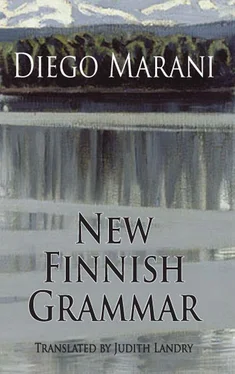I woke up with the feeling that I had not slept at all. My head ached, and there was a bitter taste in my mouth; the walls of the room looked softer in the pink dawn light. Something told me that it was late. The bell had not rung. Suddenly I understood. Walking slowly into the church — I was no longer in a hurry — I found the nurses somewhat flustered, muttering irritated comments without moving from their seats. The door of the sacristy was wide open; the half-empty bottle of koskenkorva was still on the table, and the Kalevala open at the page with the picture of Kullervo.
In the days following Koskela’s departure, I clung to my studies as though to a life jacket. When the time for my lesson came, I would shut myself in the sacristy and study every word I’d put down in my notebook, declining it in all possible cases, conjugating each verb in every voice I knew, down to the most tortuous forms of the passive, the conditional, even the past potential; undaunted now by irregular verbs with alternating consonants, I had in my head all the ‘p’s which became ‘v’s, the ‘lke’s which became ‘lje’s, the ‘ht’s which became ‘hd’s. Strong or weak, there was no stem of any verb I could not pick out in the forest of syllabic mutations, where it was enough to add one vowel to cause three consonants to disappear; then there were those nouns without so much as a diphthong, where the ‘i’s of the plural put paid to every syllable not protected by solid dentals. The only thing that sometimes floored me was polysyllabic stems, and then I would fill page after page getting them right, feeling an unhealthy pleasure at seeing those sheets so densely packed with words, those elixirs of grammar whose every line contained three or four rules, one entangled in the exceptions of another but always itself correct. When I had reached the end of my own notebook, when I’d exhausted my stock of headed notepaper from the Hotel Kämp, I had the nurses give me sheets of wrapping paper. I spread them out on the table as though they were maps of my personal campaigns, filling every last bit of them with formulae as unforgiving as equations, where every letter that I wrote weighed heavy as lead in terms of sheer mental effort. Fragile as houses of cards but logically indestructible, those syntactical digests were my defence against an enemy who was attacking me from behind. I had no tanks, no bombardiers, and each day surprised me on a different front, drawing me into the open, far from reason’s hiding-places, towards a chasm of gloomy, giddy thoughts. It was then that I needed all fifteen Finnish grammatical cases, the four forms of the infinitive, not to mention the negative pluperfect to keep my mind engaged, to drag it clear of that carpet bombing. Then I would even resort to declining my name, ‘ Sampo ’, as a noun, one of those which have a slightly odd partitive plural, and karjalainen as an adjective — at least that was regular, as round and perfect as a circle. Once again, my name was all I had. The label coming unstitched from the neck of my jacket was my identity card, my sole claim to existence, the fragile line of communication allowing me to carry on restocking my trenches and resisting the temptation to disappear, to do away with myself, like the pastor, to go back into the darkness from which I had come. The words of Doctor Friari often came into my mind, when he had encouraged me to love the Finnish language, to abandon myself to it as one would to the arms of a loving woman. Then the fire that still burned beneath the ashes should have taken on new life: I’d been blowing on those embers for months, for months I had been coaxing into life a flame which would not take. The words came out of my mouth and disappeared like stones thrown into the sea; nothing of them stayed in my brain. My memory was nothing but a list of words, a dictionary, a conversation manual. Ilma — perhaps she was the answer; but I could not love Ilma without first knowing who I was. I could not offer her the heart of someone I did not know. Perhaps because I wished her well, I could not love her. Not even my feelings were really my own. I bore the name of the body I inhabited, but I did not have its heart. This was something that Doctor Friari had never understood, and I did not have the words to explain it to him. After all these months, I realized that I was as alone as I had been on that first day. The anguish which had nailed me to the bed that first afternoon was still within me, entire and unabated.
Had I been able to be at that man’s side during his time in Finland, I am certain that today we would be able to laugh together about Sampo Karjalainen. We would have gone to Kappeli’s, sat down in front of a tankard of beer and talked to each other about our experiences in the war, mine on board the Tübingen and his on the streets of Helsinki. Then even this grim winter would have seemed less dire, its snow and stars dispelling thoughts of darkness. I feel even more bitter reading these lines when I think how little it would have taken for him to have come through unscathed. If he had held on for another few weeks the war would have been over, Miss Koivisto would have been back in Helsinki and everything would have been different; because, however unfeeling, no human heart can hold out against a woman in love. A woman in love is a physical presence, a body which, of all those on earth, seeks out and desires only our own. We are animals, we are made of flesh and blood, we have need of the body in order to gain a sense of the soul. Of each lost love, it is the body that we mourn and, could we but keep it, even lifeless, even mute, but intact, we would make do with that. For bodies we are ready to build pyramids, and even after a hundred years a man is not dead until his body has been found. We refer to him as missing, we imagine him dragging out some kind of existence in a distant, hostile land, clinging grimly on to life, desperate to come home. We cannot help him, we cannot go out towards him, because anyone who has gone so far away is always in the wrong and must pay a price, a ransom. All we can do is wait for him, it is our duty to wait for him, and this may be a lifelong wait. Only the return of his body can free us from this waiting.
It is little consolation to me to see that my advice was valid: only a woman could have saved that man, and Miss Ilma almost succeeded. I had been right. My diagnosis had been correct; the medicine had been what was needed. But I had proffered it to the wrong patient.
These last pages are in a poor state. Some parts are stained with liquid, possibly koskenkorva, and the writing is smudged, though the basic meaning has not been lost. I found no trace of the second exercise book of which the author speaks, presumably used solely for studying the Finnish language, nor of the sheets of packing paper given him by the nurses. From this point onwards the document is no longer written in ink, but in indelible pencil. Although it is less methodical than the earlier parts, it shows a surer grasp of the language which this man had been so effortfully obliged to learn; even the mistakes are more academic, often due to the discrepancy between the spoken and the written language. All in all, it might indeed be said that that man had learned, or perhaps constructed, his own personal version of the Finnish language, a language all his own, handworked and roughly cut, where each word needed correcting, filing down, before it could come into complete possession of its meaning.
How such a language must have sounded is hard to imagine. Miss Koivisto says that he managed to make himself understood perfectly adequately, even if he had to reformulate his sentences several times before they became comprehensible. He would alternate rudimentary and ungrammatical constructions with others taken from a printed book or idiomatic phrases, sometimes used in the wrong context. He had no concept of linguistic registers, and would use adjectives taken from the Bible alongside nouns he had heard in the bar at the Kämp. He did not give the impression of knowing the rules, but seemed to have learned the inflected forms of words according to their usage. He did the same thing with verbs, preferring the simpler constructions of the impersonal passive. As a neurologist I still marvel at this feat. My scientific knowledge fails to explain how that man could have built himself up a personality out of nothing, forged a language for himself by sheer willpower. Clearly, our minds are infinitely more powerful than we know. Shamans, saints and madmen gain mastery of this lethal weapon in different ways, and sometimes it kills them. They stray into this unknown dimension and, in their delirium, bring us back scraps of it which we find indecipherable.
Читать дальше












